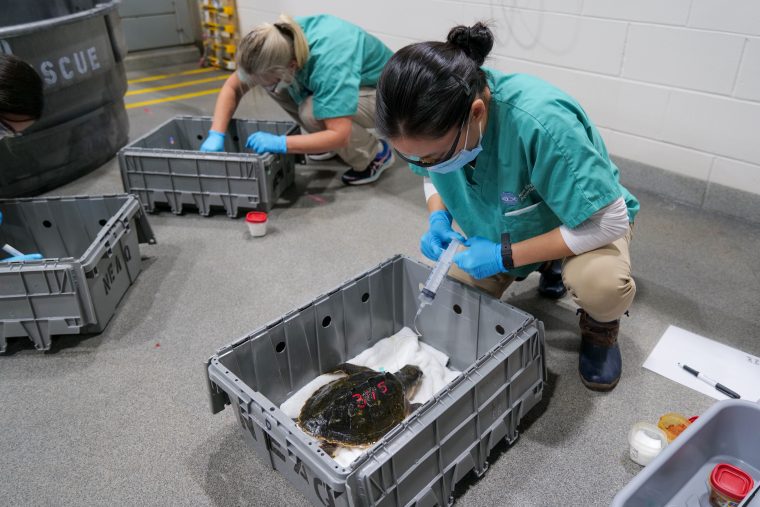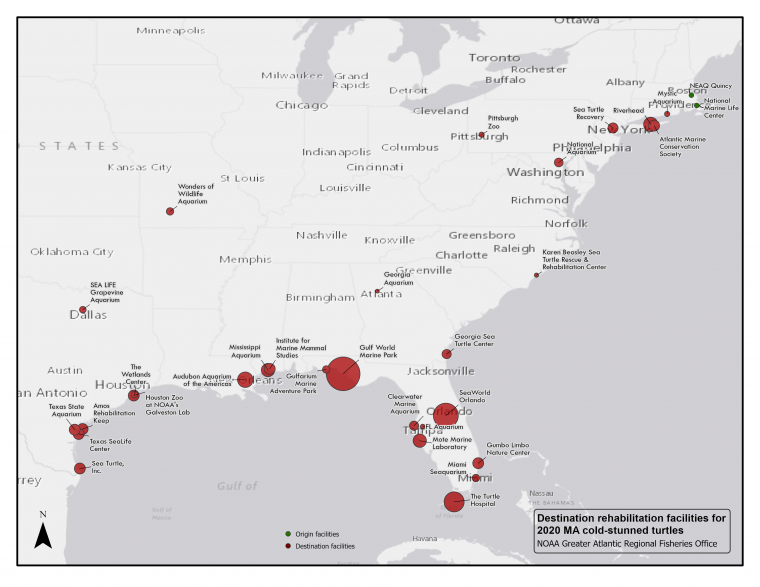The Aquarium will be closed to the public on Wednesday, April 2, for an internal staff event. Regular operating hours will resume on April 3.
Annual stranding season required tight coordination, safety protocols

BOSTON, MASS. (January 28, 2021) – Coming off a historic season that saw hundreds of cold-stunned sea turtles wash ashore on Cape Cod, the New England Aquarium is hailing the annual rescue operation a success thanks to the creation of pandemic-related protocols and a coordinated network of rescue partners.
**PHOTOS AND VIDEO OF THE 2020 RESCUE SEASON AVAILABLE HERE**
The 2020 sea turtle stranding season, which began in October, required rethinking how the Aquarium’s sea turtle hospital in Quincy, MA, triages cold-stunned turtles rescued by staff and volunteers with Mass Audubon’s Wellfleet Bay Wildlife Sanctuary. In years past, care focused more on the individual. With strict safety protocols in place, including a smaller staff to account for social distancing guidelines, the strategy for this season shifted toward population management.
“It was immensely rewarding to see that after months of planning, our new protocols were a huge success. Hundreds of endangered and threatened animals survived that otherwise may not have,” said Connie Merigo, marine animal rescue department manager at the New England Aquarium.
The Aquarium’s sea turtle hospital functions similarly to how a human patient would be admitted to a hospital. When they first arrive, the turtles are assigned a federal number to track their medical plan, acting as an identifier for prescriptions and other specialized care. The turtles then receive a physical exam, replacement fluids, heart rate and respiration assessment, wound care as needed, and a trial swim. The trial swim helps biologists and veterinarians determine the turtle’s level of activity and alertness. Turtles also get X-rays to assess for fractured bones and lung condition, and those with lung disease receive antibiotics.
Amid the pandemic, staff biologists used new temperature zones to raise rescued turtles’ body temperature. Turtles were raised 10 degrees (F) every 24 hours until they reached 75 degrees (F). This system helped process more animals, especially important during a record-breaking year for live sea turtle intake. The Aquarium admitted 569 sea turtles and National Marine Life Center triaged 206 for a total of 775.
Being able to quickly free up valuable space at the Aquarium’s sea turtle hospital was a key component to this season’s success. Once the turtles were rehydrated and stable, a staff veterinarian cleared them for travel to a secondary rehabilitation facility. The Aquarium worked closely with colleagues at the National Oceanic and Atmospheric Administration’s (NOAA) Fisheries Service and the non-profit organization Turtles Fly Too to identify rehabilitation centers across the country that could take the stabilized turtles from Massachusetts to make room for new arrivals. A total of 29 facilities stepped up to take in rescued turtles this season. About 50 sea turtles will remain at the Aquarium to continue their journey back to health before being released into the wild.
“The cooperation and dedication of all the organizations involved resulted in a hugely successful conservation intervention,” Merigo said.

The sea turtle rescue program is featured in the final episode of A Perfect Planet, a new nature series on Discovery+ hosted by Sir David Attenborough. Episode 5, “Humans,” premiered on January 24 and explores efforts to address climate change and other human-caused environmental threats.
MEDIA CONTACT:
Pam Bechtold Snyder – psnyder@neaq.org, 617-686-5068
